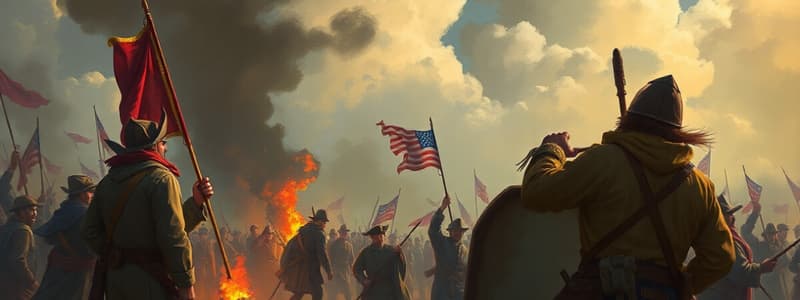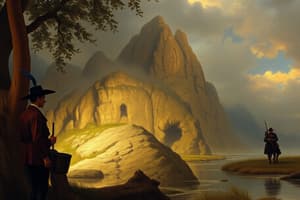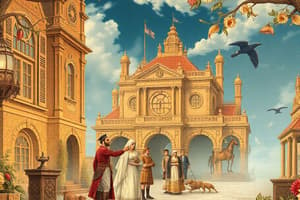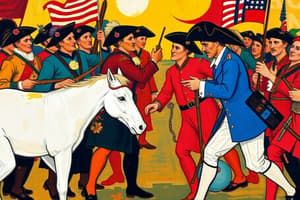Podcast
Questions and Answers
What event prompted Paul Revere to ride through the countryside on April 18, 1775?
What event prompted Paul Revere to ride through the countryside on April 18, 1775?
- A major storm was approaching the colonies.
- British troops were attacking Boston.
- The British troops were ordered to seize weapons in Concord. (correct)
- Colonists were ready to rebel against the British.
Loyalists were colonists who believed they should govern themselves independently from Great Britain.
Loyalists were colonists who believed they should govern themselves independently from Great Britain.
False (B)
What was one reason for the rapid population growth in the American colonies by 1750?
What was one reason for the rapid population growth in the American colonies by 1750?
Religious tolerance
The period during which the British government largely left the colonies to govern themselves is known as _____ neglect.
The period during which the British government largely left the colonies to govern themselves is known as _____ neglect.
Match the following terms with their descriptions:
Match the following terms with their descriptions:
What major conflict in the 1750s influenced the relationship between the colonies and Great Britain?
What major conflict in the 1750s influenced the relationship between the colonies and Great Britain?
What was one of the powers of the colonial assemblies?
What was one of the powers of the colonial assemblies?
George Washington was appointed by the British army to lead the militia into the Ohio Valley.
George Washington was appointed by the British army to lead the militia into the Ohio Valley.
Who led the opposition to the Townshend Acts?
Who led the opposition to the Townshend Acts?
What action did George Hewes and the Sons of Liberty take during the Boston Tea Party?
What action did George Hewes and the Sons of Liberty take during the Boston Tea Party?
The Intolerable Acts were intended to encourage the colonists to pay for the destroyed tea.
The Intolerable Acts were intended to encourage the colonists to pay for the destroyed tea.
The Proclamation of 1763 drew a line down the crest of the __________ Mountains.
The Proclamation of 1763 drew a line down the crest of the __________ Mountains.
Which item was NOT taxed under the Townshend Acts?
Which item was NOT taxed under the Townshend Acts?
What did Patrick Henry declare to unite the delegates at the First Continental Congress?
What did Patrick Henry declare to unite the delegates at the First Continental Congress?
The colonists who sided with Great Britain during the conflict were known as _____ .
The colonists who sided with Great Britain during the conflict were known as _____ .
The boycott of British goods was supported by both Patriots and Loyalists.
The boycott of British goods was supported by both Patriots and Loyalists.
What was the main purpose of the Townshend Acts?
What was the main purpose of the Townshend Acts?
Match the following events and their descriptions:
Match the following events and their descriptions:
Match the following individuals with their associated actions or statements:
Match the following individuals with their associated actions or statements:
What was one consequence of the Intolerable Acts?
What was one consequence of the Intolerable Acts?
What event is referred to as the Boston Massacre?
What event is referred to as the Boston Massacre?
The Boston Massacre occurred on March 5, 1770.
The Boston Massacre occurred on March 5, 1770.
Who was the first person to die during the Boston Massacre?
Who was the first person to die during the Boston Massacre?
The Boston Tea Party was a protest against the _____ Act.
The Boston Tea Party was a protest against the _____ Act.
Match the following figures to their roles during the Boston Massacre and Tea Party:
Match the following figures to their roles during the Boston Massacre and Tea Party:
Which was the main aim of the Tea Act?
Which was the main aim of the Tea Act?
Colonists accepted the Tea Act without any protests.
Colonists accepted the Tea Act without any protests.
What was one result of the British troops being stationed in Boston?
What was one result of the British troops being stationed in Boston?
_____ was the local silversmith who created an engraving of the Boston Massacre.
_____ was the local silversmith who created an engraving of the Boston Massacre.
How did John Adams view his defense of the British soldiers?
How did John Adams view his defense of the British soldiers?
Flashcards
American Revolution
American Revolution
A rebellion of American colonies against British rule in the 1770s.
Patriots (Whigs)
Patriots (Whigs)
American colonists who favored independence from Great Britain.
Loyalists (Tories)
Loyalists (Tories)
American colonists who remained loyal to the British Crown.
Salutary Neglect
Salutary Neglect
Signup and view all the flashcards
Colonial Growth
Colonial Growth
Signup and view all the flashcards
British Debt and Empire Expansion
British Debt and Empire Expansion
Signup and view all the flashcards
Self-government in the colonies
Self-government in the colonies
Signup and view all the flashcards
Ohio Valley dispute
Ohio Valley dispute
Signup and view all the flashcards
Fort Duquesne
Fort Duquesne
Signup and view all the flashcards
George Washington's early military career
George Washington's early military career
Signup and view all the flashcards
Proclamation of 1763
Proclamation of 1763
Signup and view all the flashcards
Townshend Acts
Townshend Acts
Signup and view all the flashcards
Colonial Boycott
Colonial Boycott
Signup and view all the flashcards
Repeal of Townshend duties (except for Tea)
Repeal of Townshend duties (except for Tea)
Signup and view all the flashcards
Boston Massacre
Boston Massacre
Signup and view all the flashcards
Townshend duties
Townshend duties
Signup and view all the flashcards
Crispus Attucks
Crispus Attucks
Signup and view all the flashcards
Tea Act
Tea Act
Signup and view all the flashcards
Boston Tea Party
Boston Tea Party
Signup and view all the flashcards
Loyalists
Loyalists
Signup and view all the flashcards
Patriots
Patriots
Signup and view all the flashcards
Mob violence
Mob violence
Signup and view all the flashcards
John Adams
John Adams
Signup and view all the flashcards
Monopoly
Monopoly
Signup and view all the flashcards
Intolerable Acts
Intolerable Acts
Signup and view all the flashcards
First Continental Congress
First Continental Congress
Signup and view all the flashcards
Colonial Militias
Colonial Militias
Signup and view all the flashcards
Study Notes
American Revolution: Causes and Early Stages
- Colonial Discontent: Growing tensions between Great Britain and the American colonies stemmed from Britain's increasing control and imposition of taxes after the French and Indian War. Colonists, accustomed to self-governance, resented these changes.
- Salutary Neglect (pre-1763): Prior to 1763, the British government largely ignored colonial affairs, allowing significant freedom in self-governance through elected assemblies. This fostered a sense of independence.
- Expansion Westward: Colonial expansion into the Ohio Valley, claimed by both Great Britain and France, led to conflict culminating in the French and Indian War. This war left Britain burdened with debt.
- The Proclamation of 1763: The British government prohibited westward settlement beyond the Appalachian Mountains, infuriating colonists eager for land. This act demonstrated British attempts to control colonial expansion.
- The Townshend Acts (1767): Imposed duties (taxes) on imported goods like glass, paint, paper, and tea. These sparked boycotts of British goods, led by figures like Samuel Adams.
Colonial Response to British Policies
-
Boycotts: Colonists organized boycotts of British goods, motivated by the desire to oppose taxation without representation. Women played a crucial role in supporting the boycotts.
-
The Boston Massacre (1770): A conflict between British troops and Bostonians, resulting in the death of five colonists. This event intensified anti-British sentiment.
-
The Boston Tea Party (1773): The British East India Company's Tea Act, granting a monopoly, angered colonists. The Boston Tea Party, orchestrated by the Sons of Liberty, saw tea dumped into Boston Harbor in protest. This event profoundly angered the British.
-
The Intolerable Acts (1774): Parliament's reaction to the Boston Tea Party; punitive measures aimed at punishing Massachusetts, including the closing of Boston Harbor and limitations on colonial self-governance. The acts alarmed and united the colonies.
-
The First Continental Congress (1774): Delegates from twelve colonies met in Philadelphia to discuss grievances and formulate a unified response to British policies. Delegates, motivated by a desire for liberty and unity but also divided by loyalty (Loyalists vs. Patriots) sent a respectful message to King George. This congress formed a major step toward colonial unity.
-
Lexington and Concord (1775): British troops marching to Concord to seize colonial weapons encountered armed colonists at Lexington and Concord. This clash marked the beginning of armed conflict, demonstrating the colonists’ willingness to defend their liberties.
-
Colonial Militias (Minutemen): Locally formed militias, including the Minutemen in New England, prepared to oppose British forces. This response showed the colonists' readiness to defend their cause.
Key Figures and Events
- Paul Revere: Famous for his midnight ride warning colonists of the approaching British troops.
- Samuel Adams: A key leader in the opposition to British policies, known for his revolutionary oratory and writings.
- George Washington: A military leader who played a pivotal role in the early stages of the Revolution.
- John Adams: A lawyer who defended the British soldiers involved in the Boston Massacre, demonstrating his commitment to due process.
- Lord North: British Prime Minister who enacted policies that further inflamed colonial tensions and faced resistance.
- King George III: British monarch whose decisions contributed significantly to the growing divide with the colonies.
Studying That Suits You
Use AI to generate personalized quizzes and flashcards to suit your learning preferences.
Description
Explore the key causes and early developments of the American Revolution through this quiz. Dive into colonial discontent, the effects of salutary neglect, westward expansion, and significant acts that fueled tensions with Great Britain. Test your knowledge and see how these factors led to the push for independence.




